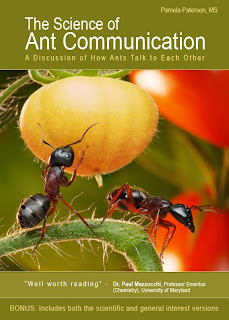I have just finished reading The Science of Ant Communication (how ants talk to each other) a free ebook by Pamela Paterson who has a master's degree in science. The interesting thing is that the ebook actually contains the same book written twice, once in an everyday layman language for the general public and then again another version written in a more scientific language for the specialists. I read both yet enjoyed the simplified version more. I guess she has written the more scientific version first then simplified it into the easier-to-read version later.
I found a few interesting things in this short ebook. She says that ants communicate with one another using various means one of which is through pheromones which are chemicals secreted by a number of different glands in present in the ant's body which are then picked up by other ants through their olfactory sense (sense of smell). Ants can also produce sounds, despite them not having ears, yet they sense the vibrations that travel through the ground. They produce the sounds not through a vocal apparatus like humans and other animals but by moving specific parts of their bodies same as like with some other insects.
It was interesting to see in the book that there are so many different kinds of ants and that they differ greatly in their habits yet still share common methods for communication. I also liked to know the specialization of ants in the ant kingdom, some of them act as guards, other scouts for food, still others clean their nest while others go out for foraging and bringing food to the nest. And of course there is the all respected queen ant same as with bees which have a queen (which some arguably call the mother in case of the bees).
One of the things that also interested me was what is called tandem running where two ants walk together in the direction of the source of food while one of them being the leader and the other the follower. The leader 'teaches' the follower how to reach the source of food. This tandem running results in slower movement yet helps the ant that is following to learn and be able to later inform the other ants and act as the leader in the next trip towards the food source with a different ant that would now act as its follower. I noticed in the references section at the end of the ebook a reference to a paper titled Teaching in tandem-running ants which made me very interested due to the word "teaching" in it.
Another interesting this she mentioned was that ants do not speak to one another directly but rather give signals that increase the probability of other ants carrying out a certain behavior. Furthermore, they may use more than one method of communication simultaneously in order to make their message get through more strongly and hasten the response from other ants.
There are so many other interesting things found in this tiny ebook that are worth reading. I recommend reading the part written in layman language rather then the one written in a more scientific one, unless you are specialized in the field.
I found a few interesting things in this short ebook. She says that ants communicate with one another using various means one of which is through pheromones which are chemicals secreted by a number of different glands in present in the ant's body which are then picked up by other ants through their olfactory sense (sense of smell). Ants can also produce sounds, despite them not having ears, yet they sense the vibrations that travel through the ground. They produce the sounds not through a vocal apparatus like humans and other animals but by moving specific parts of their bodies same as like with some other insects.
 |
| The Science of Ant Communication |
One of the things that also interested me was what is called tandem running where two ants walk together in the direction of the source of food while one of them being the leader and the other the follower. The leader 'teaches' the follower how to reach the source of food. This tandem running results in slower movement yet helps the ant that is following to learn and be able to later inform the other ants and act as the leader in the next trip towards the food source with a different ant that would now act as its follower. I noticed in the references section at the end of the ebook a reference to a paper titled Teaching in tandem-running ants which made me very interested due to the word "teaching" in it.
Another interesting this she mentioned was that ants do not speak to one another directly but rather give signals that increase the probability of other ants carrying out a certain behavior. Furthermore, they may use more than one method of communication simultaneously in order to make their message get through more strongly and hasten the response from other ants.
There are so many other interesting things found in this tiny ebook that are worth reading. I recommend reading the part written in layman language rather then the one written in a more scientific one, unless you are specialized in the field.

